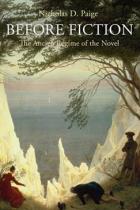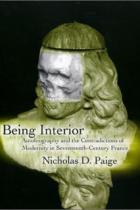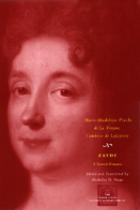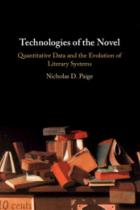
Nicholas Paige
Professor of French
Research Areas
The bulk of my teaching and research concerns the early modern period, essentially the 17th and 18th centuries. My latest book is Technologies of the Novel: Quantitative Data and the Evolution of Literary Systems (Cambridge UP). The study, which was supported by a Guggenheim fellowship, aims to be the first quantitative history of the novel: it traces the incubation, development, and subsequent abandonment of a variety of formal devices via a systematic sampling of the production of French- and English-language novels over the years 1600-1830. Drawing from studies of the evolution of technological artifacts, I argue that the novel is not one evolving (or “rising”) entity, but rather a system composed of discrete forms in constant but patterned flux. My previous book, Before Fiction: The Ancien Régime of the Novel (U Penn Press, 2011), awarded the 2013 ASECS Gottschalk prize for best book on the 18th century, provides a history of the novel from the point of view of fictionality (for me, the notion that literary characters need not be “real people”). Currently, I'm working on a series of interlocking longue durée case studies — of the novel, of the painted landscape, of "aesthetics" — that, taken together, offer a way of modeling the evolution of cultural artifacts that departs from long-dominant modes of “historicizing.” A side project on such technological evolution aims at quantifying the use of "scenes" in the (English) novel circa 1800.
The Townsend Center Book Chat on Technologies of the Novel (April 7, 2021, with Prof. Dorothy Hale) can be found here. A related podcast from Stanford's Center for the Study of the Novel, featuring discussants Margaret Cohen, John Bender, and Chloe Edmondson, is here.
Selected Publications
"Lafayette en Angleterre au XVIIIe siècle: Méditations méthodologiques sur une réception manquée." PFSCL vol. 51 (2025), 373-87;
"The 'Willing Suspension of Disbelief': The Long History of a Short Phrase." The Routledge Handbook of Fiction and Belief, ed. Alison James, Akihiro Kubo, and Françoise Lavocat (Routledge, 2024), 28-40.
"La Religieuse et le problème de la sensibilité." Lecteurs et actes de lecture dans les écrits de Diderot, ed. Adrien Paschoud and Thomas Klinkert (Slatkine, 2023);
"Still Lifes and Sublime Vistas: On the Non-Modernity of Diderot's Approach to Genre Painting." Diderot Studies 38 (2022);
"The Comforts of Tartuffe," in How To Do Things with Style: Essays in Honor of Joan DeJean, ed. Roland Rascevskis and Amy S. Wyngaard (French Review Book Series, 2022);
Introduction from Technologies of the Novel (Cambridge UP, 2021);
“Histories of Fiction.” Modern Language Quarterly 82.2 (2021);
“The Evolution of the Novel System in the Long Seventeenth Century,” in Cambridge History of the Novel in French, ed. Adam Watt (Cambridge University Press, 2021);
"Pseudofactuality,” in Handbook of Narrative Factuality, ed. Monika Fludernik and Marie-Laure Ryan (Berlin: Gruyter, 2020);
“The Evolution of Literary Technologies: Sampling the Fictionality of the Novel,” NLH 48.3 (2017);
“The Artifactuality of Narrative Form: First-Person Novels in France, 1650-1830,” Poetics Today 39.1 (2018);
“Phèdre, Racine, and the French Classical Stage,” in A History of Modern French Literature, ed. Christopher Prendergast (Princeton: Princeton University Press, 2017), 190-211;
Preface and Introduction to Before Fiction: The Ancien Régime of the Novel (U Pennsylvania P, 2011);
Lafayette’s Zayde: A Spanish Romance (trans., U Chicago P, 2006);
Being Interior: Autobiography and the Contradictions of Modernity in Seventeenth-Century France (U Pennsylvania P, 2001).



